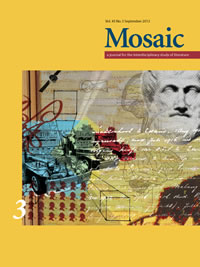Issue 45.3
Overview

General Issue
Published: September 2012
View the issue introduction or see the issue summary and contents below.
11 essays, totalling 192 pages
$21.95 CAD
This eleven-essay issue, marked by diversity, is yet woven by common threads, by recurring concern with the logic of both-and, with lateral thinking, purloining, prolonging, and, not the least, polyvocality. Some of the essays deal with memory and forgetting, others with the question of representation and its (ethical) relation to humour, particularly in life-writing.
Thomas the Marvellous: Resurrection and Living-Death in Blanchot and NancyKas Saghafi Providing an overarching interpretation of Thomas the Obscure and all of Blanchot’s work in La Déclosion, Nancy presents a powerful reading of death and resurrection. It is only by privileging L’espace littéraire and a certain interpretation of death, I suggest, that Nancy can argue for the mundaneness of resurrection rather than its “fantastic” or “miraculous” nature. | |
“cease to exist in order to be”: Worstward Ho between Badiou and DeleuzeChristopher Langlois In Handbook of Inaesthetics, Alain Badiou develops a disagreement with Gilles Deleuze over the ontology of artistic creation. By contextualizing this disagreement in Beckett’s Worstward Ho, however, we see that it is Deleuze who brings us closer to a position where the difficulties peculiar to artistic thought are better theorized. | |
Ekphrasis Refigured: Writing Seeing in Siri Hustvedt’s What I LovedAsbjørn Grønstad Noting the extensive and sustained engagement with visual media in many contemporary American novels, this essay argues that the notion of ekphrasis as a critical notion must be reconceptualized in order to accommodate the complexity of the relations between new literary expressions and the visual. | |
The Remains of Empire and the “Purloined” Philippines: Jessica Hagedorn’s Dream JungleHsiu-chuan Lee This essay examines Dream Jungle’s intervention into the imaginary configuration of the Philippines. Lacan’s elaboration on “purloin” prompts a reading of the Philippines as not simply “stolen” by imperialism but “prolonged”—via Hagedorn’s fictional creativity—into a community evolving through imperial intrusions, translocal displacements, and encounters. | |
Framed Identity: Finding Lucy in Atwood’s “Death by Landscape”Debrah Raschke Atwood’s “Death by Landscape” is a multi-layered tale linking a young girl’s disappearance to the death of Tom Thomson, a Canadian painter who inspired the Group of Seven. The paintings from the Group, which frame the camp narrative within which Lucy vanishes, are also associated with the virility ideology that Atwood subverts. | |
Sherlock Holmes and Game TheoryMichael Wainwright This essay reanalyzes the game theory interpretation by John von Neumann and Oskar Morgenstern of Arthur Conan Doyle’s “The Final Problem.” The usefulness of this interdisciplinary hermeneutic is then supplemented by lateral and philosophical thinking as prompted by subsequent tales involving Doyle’s detective. | |
The Ethics of Laughter: David Sedaris and Humour MemoirKylie Cardell and Victoria Kuttainen What is an ethics of autobiography in the context of the humour memoir? This essay examines the work of David Sedaris in order to explore how he uses the composite memoir form, and a comic style, to negotiate the problems of authenticity and authority that have become crucial in recent autobiography. | |
Traumatic Forgetting and Spatial Consciousness in Dionne Brand’s In Another Place, Not HereVikki Visvis By relying on spatial tropes, Brand’s In Another Place, Not Here investigates the competing ideological implications of deliberate traumatic forgetting, suggesting both its productive and problematic dimensions, and thereby complicates current discourses of trauma, particularly by rendering questionable the primacy of remembrance in contemporary discussions. | |
Weltgeschichte als Weltgericht: le corps hétérotopique dans Une tempêteChien-Hung Chen Dans Une tempête, le renoncement de Caliban aux habits de Prospero concrétise la Négritude et sert de tourniquet menant au Weltgericht als Weltgeschichte. Le masque donne naissance au corps hétérotopique qui communiqué la sphère du personnage avec celles de l’acteur et du spectateur, réalisant le désabusement de la mémoire. | |
Poetry, Polyvocal, Philosophy: A Thought ExperimentGene Washington This essay explores the polyvocality between poetry and philosophy. Using an Aristotelian (and Peircean) approach, the author examines how linguistic forms like negation, the “actual,” and the “virtual” inform the polyvocal. Central is the claim that the polyvocal is prior to poetry and philosophy in time, account, and knowledge. | |
Creating/Vanishing: The Gypsy Muse in Works by Arnold, Kalda, Janáek, and Vaughan WilliamsAllan C. Christensen A dangerous gypsy muse inspires creativity in the two poems and their musical settings. While enacting their creations, the works perform vanishing acts too, in allusion to their superseding of previous works. Our interest in their vanished origins recalls Darwin’s fascination with the creative sources in Nature, with which the gypsy muse is associated. |